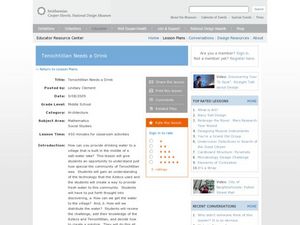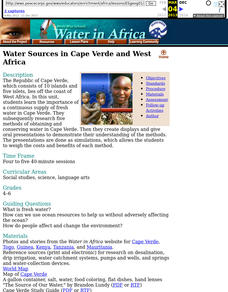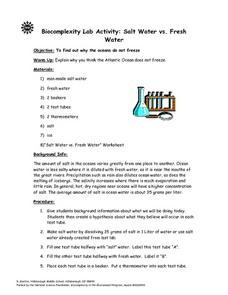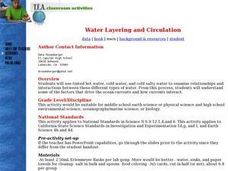Curated OER
Floating Pencil
Students discover how salt water makes a pencil float better than freshwater by measuring and comparing the lengths of the portion of the pencil that floats above the water surface. They then determine if an unknown water sample is...
Curated OER
Water Issues on Puerto Rico and Oahu: A Comparison of Two Islands
Fifth graders explore how the tow islands receive and use fresh water. They also address some of the threats to the fresh water supply on each island. Students explore the lesson objectives through water cycle models and experiments.
Curated OER
Tenochtitlan Needs a Drink
Students engineer a way to provide drinking water using Aztec technology. In this engineering a way to provide drinking water using Aztec technology lesson, students find a way to deliver fresh water to a city surrounded by salt water. ...
Curated OER
Boat Safety and Water Sports - Lesson 4 - Dangerous Sea Creatures
Lesson 4 is part of a 22 lesson unit on boat safety and water sports. This lesson is about dangerous sea creatures, mainly in the ocean. There is a link to find pictures of the creatures discussed. It is suggested to click on the...
Curated OER
Biocomplexity Lab Activity: Creating Salt Water
The lesson seeks to intorduce to students the properties of salt water and how to create salt water. Teacher gives backgound information about salt water to students. From that point, students dscuss what elements are in salt water....
American Chemical Society
Changing the Density of a Liquid - Adding Salt
Fourth in a set of several little lessons on density, this one compares the density of fresh and salt water. First by demonstration, and then by a hands-on activity, learners find that adding salt increases the density, as is evidenced...
Curated OER
Water Sources in Cape Verde and West Africa
Young explorers study the scarcity and importance of a continuous supply of fresh water in Cape Verde. They research the five main ways that fresh water is obtained in these countries. Each research group prepares a presentation, and...
Curated OER
MEASURING THE DENSITY OF WATER
Students perform an experiment to measure the density of tap water vs. salt water.
University of Georgia
Heating and Cooling of Land Forms
Compare heating and cooling rates of different land forms. A lab activity has groups collect data on the rate of heating and cooling of soil, grass, saltwater, fresh water, and sand. An analysis of the rates shows how the different land...
Curated OER
Sea Water Freeze
Middle schoolers observe how salinity affects the time it takes water to freeze. They participate in an experiment to determine that ice is essentially salt-free whether formed from fresh or salt water
Georgian Court University
Introduction to Marsh Ecology
Compare and contrast the characteristics of fresh and salt water marshes. After exploring the typical plants and animals found in each marsh type, participants use a set of flash cards to sort into fresh and salt water marsh life. Their...
Curated OER
Summer Intern
Your young apprentices build a function describing the percent concentration of salt in a brine. The rational function is then related to the parent function, y= 1/x, and graphed. Finally, the apprentices predict the amount of fresh...
Curated OER
Salt Water vs. Fresh Water
Students explore why the oceans do not freeze. They explain why they think the Atlantic Ocean does not freeze. Students are given background information about what they are doing. They create a hypothesis about what they believe...
Curated OER
Water Layering and Circulation
Young scholars examine relationships and interactions between different types of water. They experiment with colored water of different temperature and salinity and discuss how the results relate to real ocean currents.
Curated OER
What is a River?
Students study the various types of bodies of water: rivers, oceans, lakes and ponds. They observe models of each and then use clues to discuss how they are alike and different. They imagine they have found a new planet and draw a map...
Curated OER
A SALT WATER-Y WORLD
Students observe a model of the distribution of the earth's water and compare the relative volumes and percentages of types of water on earth.
San Francisco Public Utilities Commission
Water from the Well
How much water does it take to brush your teeth? How about to wash your clothes? Perform an experiment that measures water usage in everyday tasks and compares them to the days before indoor plumbing, specifically the California gold...
Curated OER
Diaper Challenge
Young scholars compare the absorbency of a regular diaper and a swim diaper in fresh water and salt water. In this absorbency lesson plan, students mass the diapers and place them in water and determine the change in mass. They do the...
Curated OER
The Sun as the Driving Force of the Water Cycle
Learners study the water cycle and how the sun is an important factor. In this water cycle lesson plan students investigate how to desalinate water and explore the different densities of fresh versus saltwater.
Curated OER
One World Ocean
Students compare and contrast the properties of salt water in the oceans/seas and freshwater elsewhere on the planet. They also analyze mixing caused by currents in the ocean, including the effects of warm and cold water as well as with...
Curated OER
Aquatic Organisms and Their Habitats
Middle schoolers investigate the presence of specific organisms in a freshwater habitat to determine the quality of that habitat. They conduct a field study and distinguish and classify organisms found during the field study.
Curated OER
The Weight of Water
Students examine how salt water is more dense than fresh water through experimentation with eggs.
Curated OER
Osmosis
Fifth graders explore osmosis as they watch organisms divide. In this organism instructional activity, 5th graders use potatoes to experiment with the effects of salty water in the body. Students discuss what osmosis is and record what...
Curated OER
Is the Hudson River Too Salty to Drink?
Learners explore reasons for varied salinity in bodies of water. In this geographical inquiry lesson, students use a variety of visual and written information including maps, data tables, and graphs, to form a hypothesis as to why the...

























